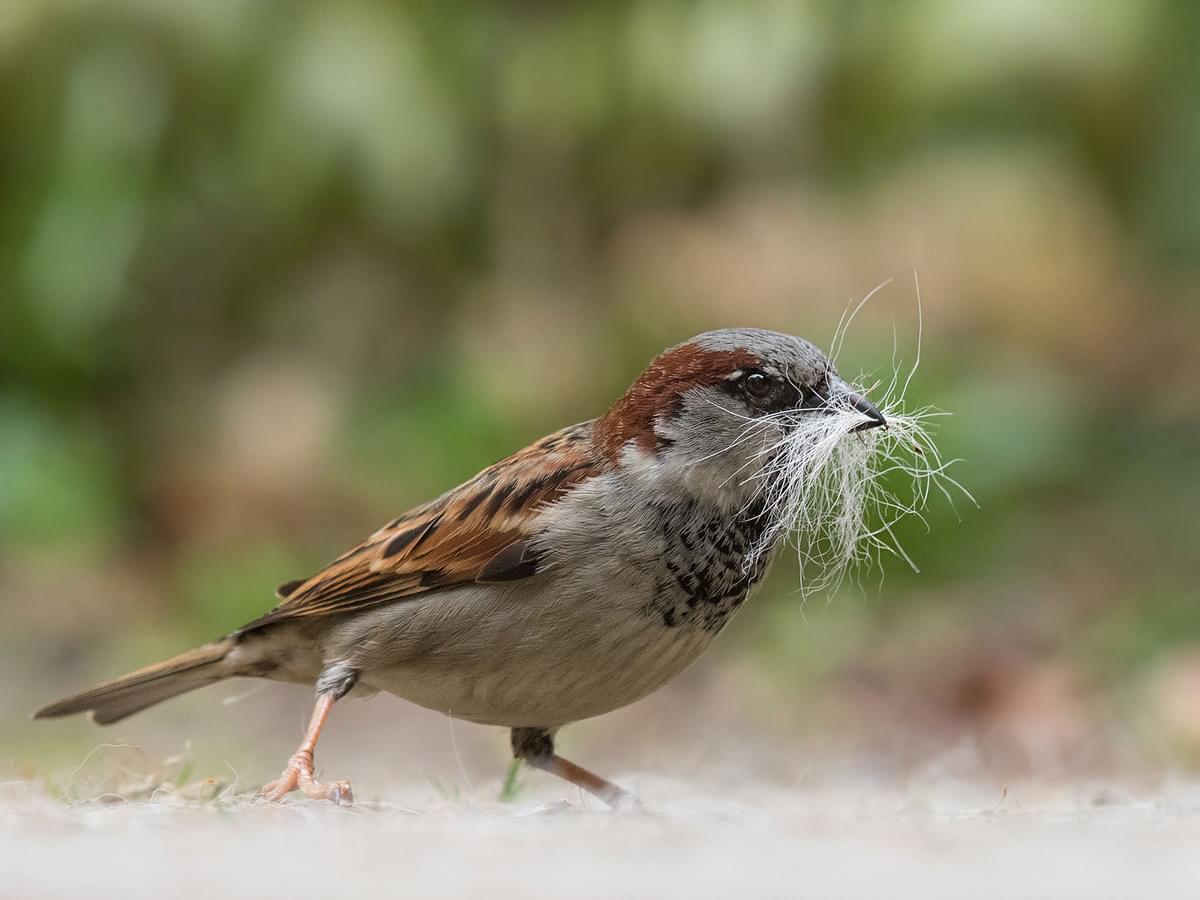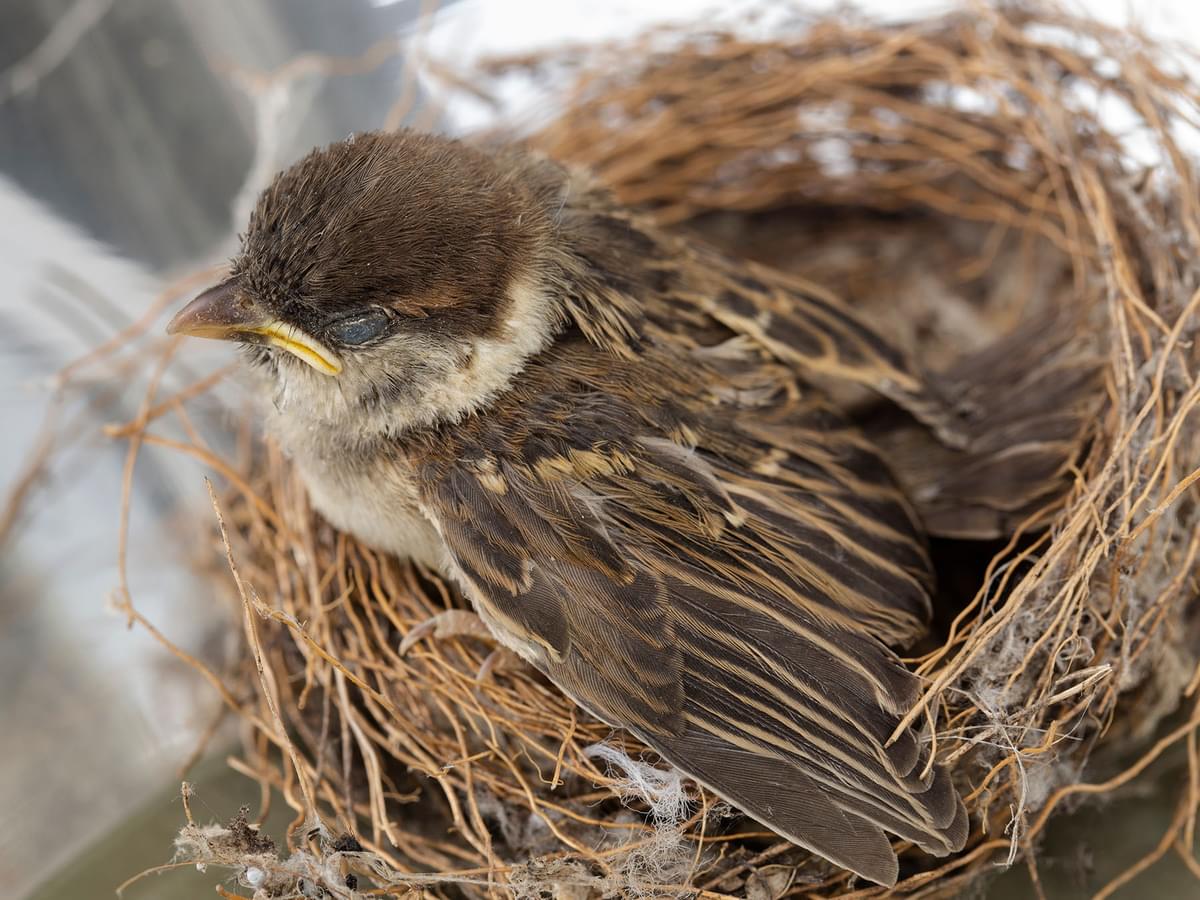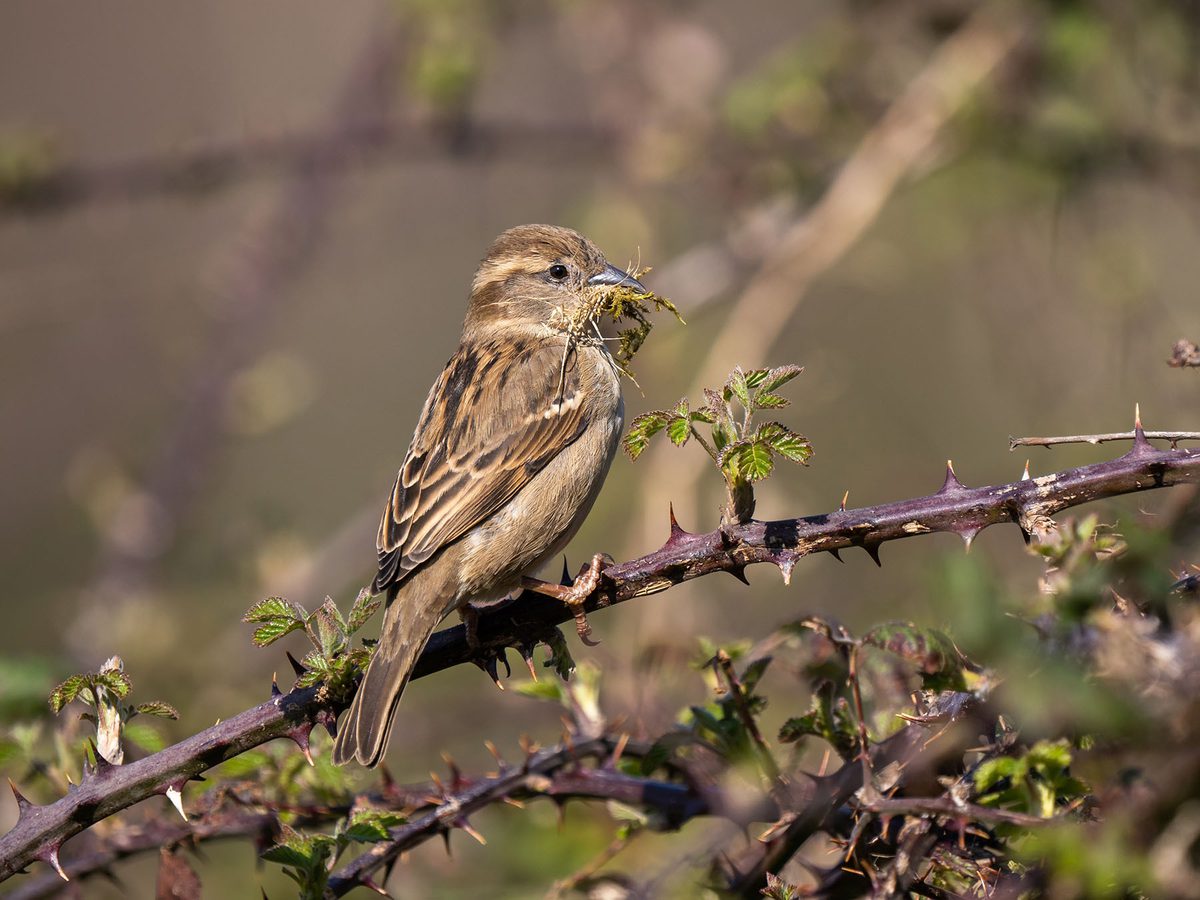Jump to Section
House Sparrow Nesting (Behavior, Eggs + Location)
Last updated: 16 January 2023

The House Sparrow (Passer Domesticus) is one of the most widespread bird species on Earth, occurring just about everywhere that people live. These ubiquitous songbirds were introduced to the United States in the mid-19th century.
They have since colonized the country from north to south and coast to coast. You’ve probably seen these old-world Sparrows around your home, but do you know where they nest?
House Sparrows nest in a wide variety of sites, although they prefer cavities in buildings and other human-made structures. These birds also use nest boxes, often outcompeting and even evicting native cavity nesters like Bluebirds.
House Sparrows produce several broods during their drawn-out nesting season, and a single pair could raise twenty offspring under ideal conditions. Both partners work together to raise their chicks, which certainly increases their success rate. They also save time by reusing their untidy, ball-shaped nests.
This article covers the nesting habits of the much-maligned House Sparrow, a familiar bird that shares our town, cities, and homes. Read on for the answers to all your House Sparrow nesting questions.

Close up of a House Sparrow peeking out of its nest, made in the roof of a house
Nest Location
House Sparrows tend to nest in the vicinity of people. They often build their nests out of sight, but you can locate them by watching the birds and looking for loose nesting material hanging from the nest site. Keep reading to learn more about where House Sparrows build their nests.
Where do House Sparrows nest?
House Sparrows are very adaptable when it comes to choosing a nest site. Their ability to nest in both natural and artificial structures has benefited the expansion of the species. They prefer to nest in enclosed spaces like holes and cracks, but they will also build their nests in dense vegetation.
Our homes and buildings provide many nesting opportunities in the form of gutters, roofs, vents, and other sheltered spots. These birds readily use nest boxes put out for native species.
House Sparrows are highly protective over their nests, although they are non-territorial and will often build their nests in colonies, sometimes with neighboring nests made right up against each other. These birds can be a nuisance and often build their nests in inconvenient places like vents and even traffic lights.

As well as cracks and holes, House Sparrows build their nests in dense vegetation
Do House Sparrows reuse their nest?
House Sparrows often reuse their nests. They can do this because they usually build their nests in cavities and other sheltered places. They use the same nest for each brood in a nesting season but will also reuse a nest in subsequent breeding seasons.
Do House Sparrows nest in backyards?
House Sparrows are abundant backyard birds. They will readily nest around our homes wherever they find a suitable nest site.
What trees do House Sparrows nest in?
House Sparrows do not usually nest in trees, although they will use conifers that offer dense foliage. These adaptable birds also build their nests in vines that grow against the sides of buildings.
Do House Sparrows use nest boxes?
House Sparrows often use nest boxes provided for native bird species like Eastern Bluebirds and Purple Martins. They are difficult to discourage but can be frightened off with fishing lines tied near the entrance and roof of the box or with so-called ‘Sparrow spookers’.

House Sparrows readily use nest boxes
Nest Appearance
House Sparrow nests do not have a particularly unique shape, but you can usually identify them by their location and by watching for the breeding birds. So how big are House Sparrow nests, and what do they look like?
What do House Sparrow nests look like?
Free-standing House Sparrow nests are rather untidy, spherical structures, complete with short tunnel-like entrances at the top or side. House Sparrow nests built in cavities and nest boxes are tall structures with open tops.
The nest is made chiefly from dried plant material but also includes feathers, string, paper, plastic, and other materials. House Sparrows use softer materials to line the nest for comfort and insulation.
How big are House Sparrow nests?
House Sparrow nests are variable in size because these birds often build their nests to match and fill an available cavity or nest box. However, they also build free-standing nests in vegetation and other sheltered spots. These nests are roughly ball-shaped with a diameter of 12 to 16 inches (30 - 40 cm).

Close up of a House Sparrow nest, with unhatched eggs inside
Phenology
The House Sparrow nesting period is one of the factors that contributed to their rapid colonization of the United States and many other parts of the world. Read on for more about the timing of House Sparrow nesting.
What time of year do House Sparrows nest?
House Sparrows have a very long nesting season. They nest most actively from late winter to early summer, with a peak in spring. Nesting can begin as early as January in some areas and end as late as October in the fall.
How long do House Sparrows nest for?
House Sparrows nest for most of the year in favorable climates. Nest construction is rapid, and the birds can start just days before laying the first egg. Each brood takes just five weeks or less from when the eggs are laid to when the baby birds leave the nest.
Let’s take a look at the timeline of a typical House Sparrow nesting cycle.
- Egg laying: 1 - 8 days (Average 5 days)
- Incubation: 10 - 14 days (Average 11 days)
- Fledging: 10 - 16 days (Average 14 days)
House Sparrows usually begin subsequent broods about a week after the chicks fledge the nest. These broods are completed in less time because the pair often re-use their nest.
What month do House Sparrows lay eggs?
House Sparrows are known to lay eggs in most months of the year. The peak egg-laying months are between March and September in the United States. In the UK, nesting generally takes places from April to August.

Young House Sparrow chick in the nest, close to fledgling
Nest Construction
How do House Sparrows build their nests?
House Sparrows prefer to nest in holes, cracks, nest boxes, and other cavities. The nest is built by filling the cavity with nesting material and then completed with a soft inner lining where they lay their eggs.
House Sparrows that build their nests in more open sites like vines and trees must weave a roof over their nest to create a cavity-like effect. The resulting structure resembles a rather untidy, flattened ball.
Does the male or female House Sparrow build the nest?
Both male and female House Sparrows take part in nest building. The male begins construction before mating with a female, but she will assist later in the process. The female tends to add the soft lining to complete the nest.

Female House Sparrow perched on a bramble with nesting material in beak
House Sparrow Eggs
Knowing what House Sparrow eggs look like can help you identify which birds are nesting in your home or nest boxes. These birds lay distinctive, easily recognizable eggs. Keep reading to learn more.
What do House Sparrow eggs look like?
House Sparrows lay oval eggs that measure about 0.85 inches long and 0.6 inches across (215 x 155 mm). Each egg has a whitish ground color and is finely spotted and streaked in brown or gray.
How many eggs do House Sparrows lay?
House Sparrows usually lay five eggs per clutch. However, they can lay up to eight eggs in some cases.
Do male House Sparrows sit on eggs?
Male House Sparrows assist in incubating, although they do not spend as much time on the eggs as females. Males do not develop a brood patch to transfer maximum bod-heat to the eggs.

Six House Sparrow eggs inside the nest
Fledgling and Parental Care
House Sparrow parents work together to feed their chicks a protein-rich diet of regurgitated insects and animal feeds. So how fast do the babies grow, and how many can they have in a season?
When do baby House Sparrows leave the nest?
Young House Sparrows fledge the nest about two weeks after hatching. The baby Sparrows can leave as early as ten days if they are in danger or stay as long as 16 days in some cases.
How many broods do House Sparrows have?
House Sparrows are prolific breeders. They can have up to four broods in a season in favorable conditions.

Female House Sparrow feeding her young chicks
FAQs
Why are House Sparrows bad?
House Sparrows are non-native invasive species in the United States. Unfortunately, these birds often dominate nesting sites and readily evict native species from nest boxes, sometimes even killing the eggs, chicks, and parents of native cavity-nesting birds like Bluebirds and Tree swallows.
Can you remove a House Sparrow nest?
Federal law does not protect House Sparrows in the United States. It is legal to remove their nests. Of course, native birds may not be disturbed while nesting, so make 100% certain that the nest belongs to House Sparrows before interfering.
When can you remove a House Sparrow nest?
You can remove a House Sparrow nest at any time. You will need to wait up to a month if you prefer to let the eggs hatch and the chicks fledge, however. Bear in mind that these birds can lay a second clutch of eggs just a few days after the young fledge the nest.

Pair of nesting House Sparrows - female (left) and male (right)
Do House Sparrows abandon their nests?
House Sparrows rarely abandon a complete nest with eggs or chicks. However, birds may desert a nest if it turns out to be unsuitable for raising their young or if they are continually disturbed.
Do House Sparrows nest on the ground?
House Sparrows do not build their nests on the ground. You might find their nests anywhere from one to a hundred feet above the ground, although they build most nests at about roof height.
Where do House Sparrows nest at night?
Female House Sparrows spend the night brooding their chicks. At other times of the year, House Sparrows usually sleep in trees or dense vegetation for the night. They often roost in flocks with other House Sparrows.


